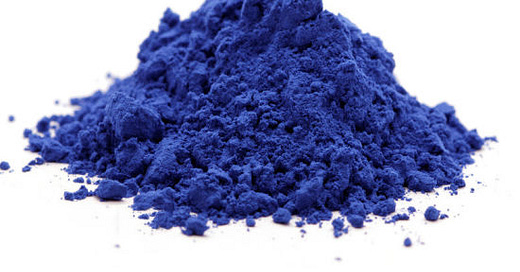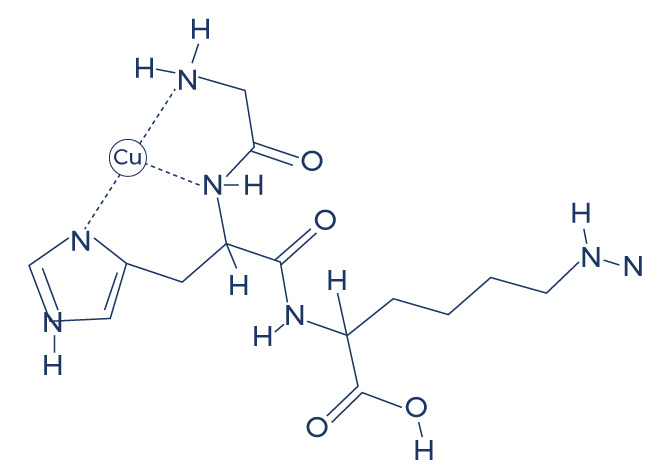GHK Copper: The Peptide I’m Most Excited About (And Skin Care Companies as Well)
It's about to be a copper rush
A few weeks ago, the FDA dropped the hammer on the compounding pharmacy network of peptide business. Many peptides were put on a Category 2 ban list for Bulk ingredients, meaning they could not be compounded any longer. This included peptides like BPC-157 that is increasingly popular.
But interestingly, they left one on the category 1 (bulk substances under evaluation, meaning they aren’t banned): GHK copper peptide, but only on the topical formulation, not injectable. And, as I write this, I have this peptide on my skin. And I’m not the only one (**cough cough skin care brands**)
What are peptide?
Peptides are chains of amino acids that are usually used in the body for signaling. Unlike other proteins or enzymes that actually convert, destroy, or build something, peptides are more like knobs that signal for a certain body system to adapt. We have thousands of different peptides in various shapes and sizes, for reproduction, immunity, weight loss and sleep.
In recent years there has been a health space BOOM surrounding peptides as people are interested in leveraging these compounds to modulate their own physiology, with or without a doctor’s guidance.
There are peptides floating in your blood stream as you read this, and some are pharmaceutical drugs. Insulin is a peptide hormone that signals to cells to uptake glucose and grow (we’ve been using this peptide therapeutically for 100 years). Popular weight loss drugs Ozempic (semaglutide) and Mounjaro (Tirzepatide) are peptides as well, in addition to other FDA approved drugs like tesamorlein and Pt-141 (bremelanotide).
Others don’t have an FDA approval and are in a “grey” zone like the notorious BPC157 and GHK copper peptide. They aren’t GRAS (generally recognized as safe) supplements that you can buy on amazon, nor are they approved pharmaceutical drugs. No pharmaceutical company has paid the millions of dollars to get these peptides approved, as there seems to be loopholes given the size of these molecules and other regulatory nonsense that plagues our medical industry (along with other conspiracy theories as to why). As such, people have been finding ways to get their hands on these peptides and using them, sometimes with a lack of rigorous human data and trials to prove their safety.
Both BPC157 and GHK-copper, along with other popular peptides are in your body right now. Your body naturally makes these peptides for certain use cases, and the goal of many is to utilize these for therapeutic purposes. They are all isolated from human or animal tissues and synthesized for further use as they are biologically available or in modified forms.
What is a “copper peptide”?
GHK copper is a tripeptide (3 amino acids: Glycine Histidine Lysine that links with copper ion (Cu) that is in your blood and skin (and topically on my face) now. The story of this peptide dates back 50 years, but strangely, given the economics of pharmaceuticals, is only achieving public consciousness now.
Dr. Loren Pickart isolated this peptide in human plasma in 1973 from human albumin and has been voraciously publishing about in in animal and human studies, especially for its wound healing and skin “regenerating” properties. Given the general public interest in peptides now, it seems that 50 years later, it’s now time for it to enter the lime light.
A young 20 year old will have copper peptide levels of about 200 ng/ml in their blood. By age 60, these levels drop to 80 ng/ml. Based on the work of Dr. Pickart, it appears that this is part of the reason that a young teenager heals can heal so quickly from a wound while my 85 year old patient takes weeks.
Thus far, Dr. Pickart’s work suggests that GHK-cu is able to:
Tighten loose skin and reverse thinning of aged skin
Repair protective skin barrier proteins
Improve skin firmness, elasticity, and clarity
Reduce fine lines, depth of wrinkles, and improve structure of aged skin
Smooth rough skin
Reduce photodamage, mottled hyperpigmentation, skin spots and lesions
Improve overall skin appearance
Stimulate wound healing
Protect skin cells from UV radiation
Reduce inflammation and free radical damage
Increase hair growth and thickness, enlarge hair follicle size
It appears to be able to do all these things endogenously by altering the expression of genes, as it seems that GHK is able to either up increase or decrease expression of 31.2% of human genes [1]. Theoretically, this is leading the cell to behave in a younger, most robust state.
Simple stated: GHK-cu does not make your skin look younger like other topical skin products, rather, it makes your skin behave younger on a genetic level, and the end result is better skin health and appearance.
If you take plasma from a young individual and apply it to liver tissue from an older individual in vitro, the liver tissue starts to produce proteins more characteristic of a younger person. Many wealthy older people obsessed with young are now doing blood transfusions from younger donors [2] . My theory is part of their perceived benefits is that the young blood is rich in GHK copper, and is restoring the levels of this peptide in the body of the longevity obsessed older person.
Because GHK-cu is only 3 amino acids long and a relatively small molecule, it can be absorbed topically when applied as a cream or a serum. Small studies of GHK-CU on skin of human females showed increased skin density and thickness, reduced laxity, improved clarity, reduced fine lines and depth of wrinkles [3].
GHK-c seems to only be biologically available:
Topical formulation onto the skin
Injectable subcutaneously
Oral consumption of this peptide seems to not be effective, given how small it is gastric juices would probably degrade it before systemic absorption is possible. But in animal studies, injecting GHK-cu in one area led to effects in other areas of the body, suggesting systemic effects [4].
What Does this Mean for You and I
I personally never really cared for skin care products nor had the time to consider a skin care routine, however the potential of topically applied GHK-Cu peptide to genetically re-program cells to be younger, both in the skin and deeper in the body has caught my attention. If my skin looks better as an aside, then that’s great as well. But I’m more excited on the potential of it to influence other tissues and for more research to come out regarding injectable GHK for other diseases:
Are we worried about side effects? There are no free lunches in biology, however given copper peptides decrease in plasma with age, the idea would be to restore the level of this peptide to youthful status. So far, I have yet to come across a clear side effect but will keep an eye out for it. Of course, none of this is medical advice and everyone has to proceed with caution. I however, feel more comfortably using copper peptide on skin rather than abrasive and sometimes toxic skin care products.
Getting GHK-Cu on Our Skin
Skin care companies that have copper peptide into their formulations already exist, however this is the wild Wild West. Copper peptide has a bluish hue to is, and many of these products are clear as water. It is unclear who actually has copper peptide in their formulation in therapeutic amounts rather than just a dash of it for marketing purposes. There is little regulation of the supplement market, let alone the skin care market. However the fact that the FDA did not put it on their banned list suggest there are insiders in the Big Skin companies who are coming out with different formulations and delivery systems for topical copper peptide.
I have been putting copper peptide onto my skin from a trusted brand for the last 2 months, as well as all the ladies in my household. The way I’d describe it is the skin looks more nourished and healthy, even in the face of long hospital shifts. The most notable change I saw was in my mom, whose skin is noticeably healthier despite her age. I also noticed that as I put this on my face, my eyebrows have grown thicker as well. And I’m not the only one to notice this, as of course, people have started making eyebrow ointments using GHK-cu.
The brand I’m using is called Mirror Skin, as I personally know the owner and can trust the quality of production given its blue hue. (I don’t benefit financially if you buy it or not). There are several copper peptide brands popping up all over Amazon, but hard to know who actually has 1% copper peptide in their formulation vs a dash of it for marketing purposes.
Most of all it is exciting to see this peptide take the arduous and slow path from being discovered in human plasma to now popping up everywhere on the internet, a story that threads together biology, research, consumerism and capitalism.
[1] Pickart L, Margolina A. Regenerative and Protective Actions of the GHK-Cu Peptide in the Light of the New Gene Data. Int J Mol Sci. 2018 Jul 7;19(7):1987. doi: 10.3390/ijms19071987. PMID: 29986520; PMCID: PMC6073405.
[2] Pickart L. Ph.D. Thesis. University of California; San Francisco, CA, USA: 1973. A tripeptide in Human Serum That Promotes the Growth of Hepatoma Cells and the Survival of Normal Hepatocytes.
[3] Leyden J., Stephens T., Finkey M., Appa Y., Barkovic S. Skin care benefits of copper peptide containing facial cream. Proceedings of the American Academy of Dermatology Meeting; February 2002; New York, NY, USA
[4] Dou Y, Lee A, Zhu L, Morton J, Ladiges W. The potential of GHK as an anti-aging peptide. Aging Pathobiol Ther. 2020 Mar 27;2(1):58-61. doi: 10.31491/apt.2020.03.014. PMID: 35083444; PMCID: PMC8789089.
Pickart L, Vasquez-Soltero JM, Margolina A. GHK Peptide as a Natural Modulator of Multiple Cellular Pathways in Skin Regeneration. Biomed Res Int. 2015;2015:648108. doi: 10.1155/2015/648108. Epub 2015 Jul 7. PMID: 26236730; PMCID: PMC4508379.
Disclaimer: The information here is for general educational purposes only and does not constitute the practice of medicine or any other medical services. No medical advice is given or provided. All should proceed with caution when exploring peptides or any other product. Users should discuss with their physician the safety and benefits/risks of using any product, supplement, or treatment, injectable or otherwise.






Excellent article. Thank you!
Great lowdown on peptides. Can you please speak about the halal status of peptides used in cosmetics industry or point to some resources which can help? Google hasnt been of much help on this question.